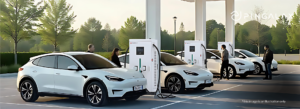Indonesia stands at the threshold of a transformative shift toward electric mobility. As Southeast Asia’s largest economy, the country has seen growing interest in electric vehicles (EVs) driven by environmental concerns, economic incentives, and advancements in charging infrastructure. However, significant challenges remain, including limited charging infrastructure, high upfront costs, and consumer skepticism.This whitepaper explores the…
Introduction
Indonesia’s commitment to carbon neutrality by 2060 has propelled initiatives to support EV adoption. However, EV penetration remains low, with only 7% of Indonesians owning an EV while 78% plan to purchase one in the next five years. Consumers cite concerns over charging infrastructure, battery life, and affordability as the primary barriers.
As a leader in smart digital energy solutions, Pingalax is at the forefront of addressing these challenges through advanced EV charging technologies. This whitepaper delves into market insights, existing barriers, policy frameworks, and technological innovations shaping Indonesia’s EV ecosystem.
Indonesia’s EV Market Landscape
Market Trends & Growth Potential
- EV sales are increasing as more consumers consider switching from traditional internal combustion engine (ICE) vehicles.
- Government incentives are in place, including tax exemptions, reduced import duties, and subsidies for domestically produced EVs.
- Infrastructure expansion efforts focus on increasing the number of public and private charging stations.
Comparison with Other Countries
Indonesia lags behind leading EV markets such as China, Europe, and the United States. While China leads the global EV adoption rate with more than 40% of new vehicles being electric, Indonesia is still in the single-digit adoption phase. Countries with robust EV infrastructure, such as Norway and Germany, have benefitted from large-scale government subsidies, strict emissions regulations, and extensive charging networks.
To catch up, Indonesia must focus on expanding public and residential EV charging infrastructure, improving financial incentives, and supporting domestic EV production.
Key Consumer Segments
1. Early Adopters (7%) – Tech-savvy consumers who prioritize sustainability and cost savings. 2. EV Prospects (78%) – Consumers planning to transition to EVs but require more confidence in infrastructure and affordability. 3. EV Skeptics (15%) – Individuals resistant to EV adoption due to concerns over range, charging convenience, and costs.
Key Barriers to EV Adoption in Indonesia
1. Limited Charging Infrastructure
- 59% of consumers worry about charging station availability, particularly outside major cities.
- Home charging remains inaccessible for many due to a lack of dedicated parking spaces.
- In contrast, China has deployed over 1 million public charging stations, including ultra-fast charging networks, making EV adoption more seamless.
2. High Upfront Costs & Limited Financial Incentives
- While long-term fuel savings are a benefit, 31% of prospective buyers cite high EV costs as a deterrent.
- Limited affordable EV models are available in the market, restricting options for middle-income consumers.
- In leading EV markets, such as Norway and Germany, subsidies cover up to 30% of the EV purchase price, making it more affordable for consumers.
3. Battery Range & Charging Duration Concerns
- 60% of consumers worry about charging time compared to refueling ICE vehicles.
- Battery longevity and replacement costs remain unclear to many buyers.
- In Europe, research into solid-state batteries is increasing, which could offer faster charging and longer lifespan.
The Role of Smart Charging Infrastructure
A well-developed EV charging network is critical to driving adoption. Pingalax offers AI-powered, efficient, and scalable charging solutions to address infrastructure gaps.

Smart Charging Solutions by Pingalax
- Standard Series DC Fast Chargers (60-240kW) – High-power fast charging with an efficiency of ≥95%.
- RACE Series AC Chargers (7/11/22kW) – Home and commercial solutions with smart load management.
- Mondrian Series (20-40kW DC Fast Chargers) – Compact, flexible installation for urban and commercial use.
- AI-Based Charging Network – Remote monitoring, dynamic load balancing, and optimized energy efficiency.
Government Policies & Industry Collaboration
The Indonesian government has launched several initiatives to support EV adoption:
- Tax Incentives & Import Exemptions – PPnBM (luxury goods tax) waivers and VAT reductions for locally assembled EVs.
- Public Charging Infrastructure Expansion – Investments in nationwide fast-charging stations.
- Corporate & Private Sector Partnerships – Encouraging real estate developers, businesses, and fleet operators to integrate EV charging solutions.
Case Study: Global EV Success Stories
- China: By implementing massive charging infrastructure investments, China has created a seamless EV experience.
- Norway: More than 80% of new car sales are EVs, thanks to tax exemptions and free public charging incentives.
- United States: The Biden Administration’s $7.5 billion EV infrastructure plan is aimed at creating 500,000 EV chargers nationwide.
Future Outlook
- Growth in Private & Public EV Infrastructure – More investments in high-speed chargers and urban charging hubs.
- Wider Adoption of Smart Charging Solutions – AI and cloud-based energy management will improve EV efficiency.
- Potential for Local EV Manufacturing – Indonesia’s nickel reserves position the country as a key player in EV battery production.
Conclusion & Recommendations
To accelerate EV adoption, Indonesia must: ✔ Expand Charging Infrastructure – Increase public and residential charging accessibility. ✔ Enhance Incentives & Financing – Introduce subsidies, leasing options, and lower EV taxes. ✔ Educate Consumers – Address battery lifespan myths and maintenance misconceptions. ✔ Strengthen Industry Collaboration – Partner with charging providers, automakers, and real estate developers.
Pingalax: Powering Indonesia’s EV Future
At Pingalax, we are committed to delivering cutting-edge EV charging solutions that drive sustainable energy transformation. With a focus on AI-driven efficiency, smart charging infrastructure, and industry partnerships, we are shaping the future of clean mobility in Indonesia.







